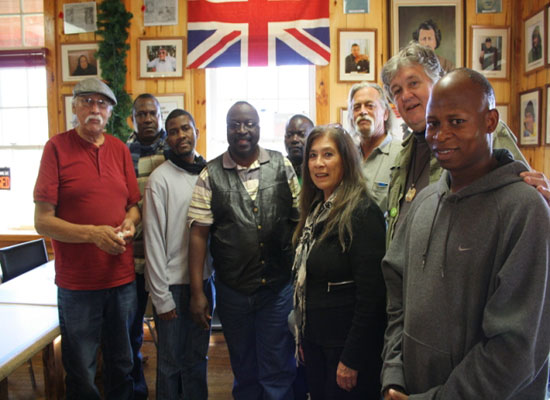October 2011: Mozambique Health Workers Tour North

Young health workers from Mozambique and their director Horacio Mandevo (centre, glasses) pose for a photo with Ric and Rose Richardson (right of Mandevo) and Don Kossick. As part of their tour through the North, the group visited Green Lake and learned about economic development, including the area's rising blueberry industry.
By Ben Ingram - Northern Pride October 4, 2011
Last week a group from Mozambique went on a tour of the Saskatchewan north doing research into what can be done to build healthier communities in their homeland.
The trip was made possible by a partnership between the University of Saskatchewan and Mozambique’s health ministry. Don Kossick of the university’s Training for Health Renewal Program said there exists many similarities between the two regions.
“There’s a real interest in sharing experiences,” he explained. “They’re looking at the economic and social determinants of health and that’s happening in Canada.”
The idea is to move away from institutionalized healthcare to develop community based approaches that combat the underlying causes of disease and poor health.
This includes both economic development and social aspects relating to health.
Horacio Mandevo is the director of a health centre in Mozambique that trains health workers, young people usually between the ages of 18 and 22, to help build healthier communities.
“Even though it’s a long distance there are actually some really interesting similarities between northern communities in Saskatchewan, and Mozambique,” Mandevo said through a translator.
“They’re rural, they’re isolated, so they’ve really had to look into their own strengths for health and development.”
Of the challenges healthcare workers have found in both regions, many are quite similar. A lack of adequate housing, proper nutrition, clean water and social stresses can have lasting negative impacts on the health of people and their community as a whole.
But said Mandevo, “It’s almost opposite there.
“Diabetes here comes from fast food and sugar. There, (in Mozambique) the opposite is true, it’s malnutrition, it’s not having the food.”
The group visited Dillon, Beauval and Pinehouse to see how the region is working towards healthier communities.
To him, it’s important to focus on the social relationship residents have with one another, especially with regards to the alcoholism and drug use that is prevalent in Saskatchewan.
“It’s not a problem like that in Mozambique. There’s drinking (but it’s) more social. We’ve seen a more isolated drinking here,” he said. Mandevo added that healthy communities take responsibility for their members by teaching one another the value of individual contributions.
“They have a point about people having to become responsible for what they are and what they do, and the community becomes responsible as well,” Kossick added. “There’s much more cohesiveness saying this community will not make it unless the individual gets themselves together and the community. It’s kind of a social responsibility.”

